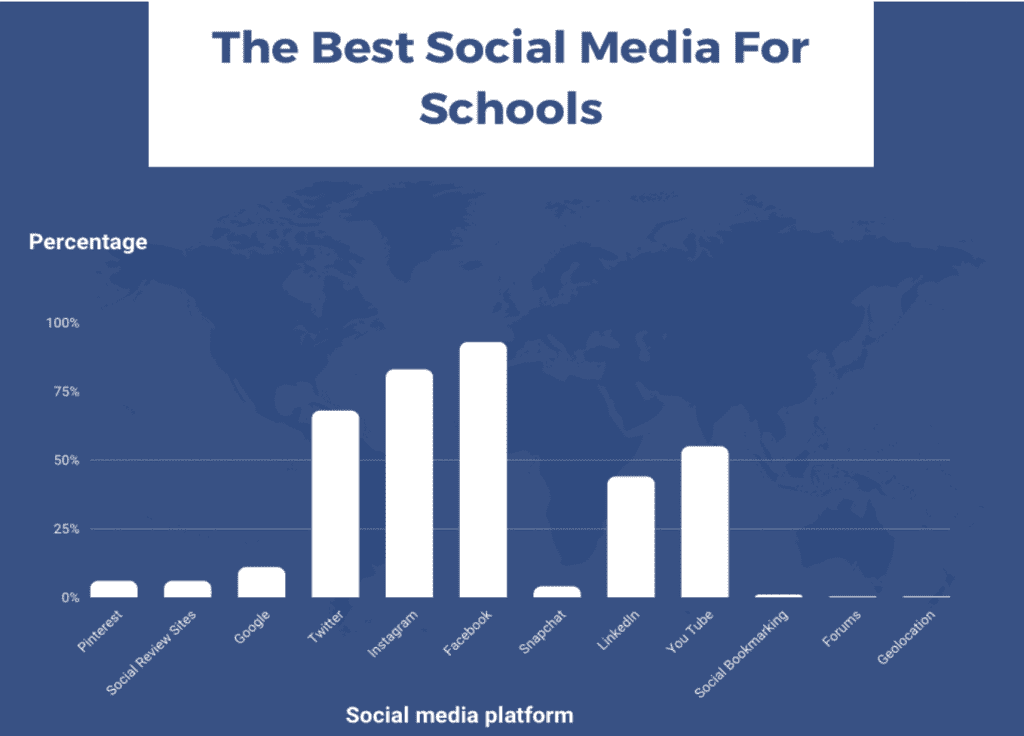Running a private school in today’s digital age has various challenges. One of the most pressing is providing high-quality education while attracting new students and parents.
To solve this problem, you may have tried traditional marketing strategies. However, due to the ever-changing shift in marketing trends, social media marketing techniques have become more effective.

As a result, in this article, we’ll walk you through the ins and outs of social media marketing for private schools. We’ll also provide tips on how to stay competitive in the education industry.
What is School Marketing?
School advertisement refers to the strategies employed by educational institutions to promote their programs, facilities, and services to potential students, parents, and stakeholders.
These strategies include print and digital advertising, social media campaigns, school activities, SEO, targeted emails, and other promotional efforts.
Furthermore, a school marketing plan aims to establish a positive perception of the institution among its target audience, separate it from rival schools, and raise enrollment and funding.
How To Market Your School?
It’s no secret that schools operate in a very competitive environment. With so many institutions competing for the attention of potential students, they must have an efficient marketing strategy to stand out from the crowd.

One of the most effective methods to accomplish this is digital marketing.
But what is digital marketing? Digital marketing for schools promotes educational institutions through various Internet marketing tactics.
So, to be successful in your school marketing strategies, here is a detailed analysis of how to market a school digitally.
Step 1 – Create a Responsive Website
Your school website serves as the front door to your institution. It’s generally the first place prospective families and students search for information about your school, making it an essential component of your digital marketing plan.
If your website is exciting and informative, it can entice visitors to learn more about your school on other platforms, such as social media; plan a visit or contact your office for more information.

So, here are the procedures to follow when developing a digital marketing strategy for private school websites.
- Conduct market research to determine who your target audience is.
- Create a comprehensive website that is visually appealing and easy to explore.
- Create helpful content that appeals to your target audience and highlights your school’s capabilities.
- Make your website mobile-friendly.
- Use SEO strategies to increase the internet visibility of your website.
- Measure the success of your digital marketing efforts with analytics tools and make adjustments as needed.
- Continually refine and update your digital marketing strategy to stay competitive.
Step 2: Make your website SEO-friendly.
Invest in search engine optimisation (SEO) to boost your rankings on search engines like Google and Bing. This strategy will help increase your school’s visibility and attract potential students looking for schools like yours.
Step 3: Email Marketing
Engage current and potential students, parents, and alums via email marketing. Distribute publications, announcements, and events, and promote the admissions process at your school.

Step 4: Paid Advertising
Use pay-per-click (PPC), Google AdWords, and social network ads to reach your target audience. These tools will assist you in attracting leads, increasing your visibility, and communicating with your target audience.
Step 5: Content Marketing
The term “content is king” is well-known in marketing and digital content creation. It refers to the notion that providing high-quality, valuable, and relevant information is critical for attracting and engaging an audience.
How do you generate content?
There are numerous ways to generate content, but the simplest is through crowdsourcing posts.
A crowdsourced post for a school’s content marketing strategy would entail reaching out to school community members, such as students, teachers, alums, and parents, to share their thoughts, experiences, and ideas about the institution.
This post would present the group’s collective viewpoint and bring a human touch to the brand.

Social Media Marketing For Private Schools
The goal of social media marketing for schools is to add value.
But what exactly is value? In social media marketing, value refers to the benefits social media activities can offer the school community, such as increased engagement, a positive reputation, and enhanced communication.
Instead of simply promoting the school, the emphasis should be on giving helpful information, communicating with followers, and establishing a community.
Furthermore, here are some methods to effectively implement a social media marketing strategy for schools:
- Lead generation.
- Lead nurture.
- Lead conversion.
Lead Generations
This objective focuses on attracting new clients and obtaining their contact information through social media.
A typical example of lead generation on social media is launching a targeted ad campaign to catch the attention of a specific audience segment.
For example, as a school brand, you can run Instagram advertisements offering e-books about your teachers’ and students’ success rates. In exchange for the e-book, interested consumers must provide their name and email address, thus turning into leads.

Lead Nurture
Once you’ve captured leads, your next goal is to nurture and create a relationship with them via social media.
This stage entails interacting with leads through personalised content, addressing their pain points, and providing value.
For example, you can start a Facebook group to share study tips, answer questions, and provide members with exclusive information.
Lead Conversion
The final goal is to convert leads into paying customers or clients. Social media plays an integral part in this stage by providing offers, discounts, or promotions suited to the leads’ requirements and preferences.
For example, you can use social media networks like Facebook and Instagram to promote a limited-time admission program with a 20% discount exclusively to your followers.
Note: Leads are more likely to convert into customers with a sense of urgency and a compelling offer.
How to get your dream clients via social media
- Identify your ideal client and the best social media platforms to contact them.
- When using social media marketing for private schools, always include a clear call to action at the end of each post.
- Always reply to comments and messages, ask questions, and share user-generated content.
- Create a memorable brand by developing a motto that connects with your target audience, such as Harvard’s ‘Veritas’ (truth).
- Make a story inventory by brainstorming back-to-school social media post ideas. You must evaluate your origin narrative and any other stories you may have.
- Analyse and quantify the outcomes of your social media advertising activities by tracking data such as engagement, reach, and conversions.
What is the most effective social media platform?

To ensure that your private school marketing strategies bear good fruit, you need to use platforms that allow you to reach your target demographic effortlessly. According to Statista, the following are the best social media platforms for schools:
- With a 93% market share, Facebook is the best social media platform for private and independent schools.
- Instagram – (83%)
- Twitter – (68%)
- YouTube – (55%)
- LinkedIn – (44%)
- Google – (11%)
- Social review sites – (6%)
- Pinterest – (6%)
- Snapchat – (4%)
- Social bookmarking – (1%)
- Forums and geolocations – (0.3%)

The Bottomline
The importance of social media marketing for private schools cannot be overstated. As illustrated throughout this article, using social media platforms is more than just a passing trend; it is critical for success in the educational industry.
Therefore, as a private school owner, you must recognise that social media marketing is a vital instrument that, when used effectively, can deliver excellent outcomes. As a result, it is critical to use the strategies outlined above to maximise social media’s potential and achieve the intended goal.
Kamran Shukurlu
Kamran is a T-shaped eCommerce Digital Marketer and Content Strategist with 9+ years of experience in 30+ industries. A few of the companies that benefited from his services: Leo Burnett, Translated, Airbnb, Samsung, Huawei, etc.
Related Posts
July 18, 2024
Social SEO: Optimising Your Content for Discovery
July 8, 2024
The Comeback of Long-Form Content
June 5, 2024
How to Import Sounds From TikTok to Instagram?
May 21, 2024
9 TikTok Challenges List And TikTok Trends
February 24, 2024
Pinterest Account Suspended Appeal – How To Do It Right?
February 3, 2024
How to Make Money With Instagram Theme Pages In 2024
January 11, 2024
Resort And Hotel Digital Marketing Campaign Strategy And Ideas
December 26, 2023
New Year and Christmas Interactive Posts and Ideas For Social Media
December 8, 2023
B2B Community Management: Unpopular Opinion To Level Up
November 23, 2023
Feel Good Friday Social Media Posts And Wishes
October 6, 2023
How to Stream Games on TikTok With TikTok Stream Key
September 15, 2023
Creating an Effective Content Calendar
September 15, 2023
10 Tips to Optimize Facebook Page for SEO and Reach More People
September 4, 2023
How to Go Live on TikTok Without 1000 Followers In 2023
August 14, 2023
How Much Does IG Models Make And How To Become One
June 26, 2023
How To Get Verified On LinkedIn In 2023?
March 25, 2023
How to Create a Facebook Group Funnel to Drive Leads
March 19, 2023
How to Mass Archive Instagram Posts in 2023 + Unarchive
March 13, 2023
8 Social Media Community Building Strategies For 2023
February 18, 2023
How To Make Money On Instagram With 500 Followers
February 18, 2023
How to Go Live on LinkedIn – Best Practices and Guides
February 8, 2023
Instagram Guides Examples and Ways to Use Them
February 8, 2023
How to Schedule Instagram Posts Without Third-party App
January 22, 2023
Growth Hacking for Instagram to Get More Followers in 2023
January 20, 2023
How To Upload GIFs on Twitter in 2023
January 3, 2023
What To Do When you go Viral on Instagram
December 23, 2022
How to Spy on Competitors’ Facebook Ads For Free (6 Tools)
December 22, 2022
How to Get More Views on LinkedIn – 10 Tips to Reach More People
December 19, 2022
What To Do Before and After Posting On Instagram
December 14, 2022
How Instagram Search Works: A Comprehensive Guide In 2022
November 15, 2022
Twitter Spaces Analytics: Ultimate Guide to Your Space Insights
November 13, 2022
20 Viral Instagram Reels Hooks To Keep People Watching
October 29, 2022
How To Speed Up Existing Video For Instagram Reels – FOR FREE
October 16, 2022
How to Use Twitter Advanced Search Tool on Mobile
October 16, 2022
7 Instagram Mistakes to Avoid & Here’s Why
October 9, 2022
10 Proven Instagram Story Ideas to Engage Your Audience
September 23, 2022
Social Media Shopping in 2022: What it Promises for Small Businesses
September 20, 2022
Tips to Create a Successful Hashtag Campaign
September 8, 2022
The Top 9 Instagram Tools That Can Boost Your SME’s Visibility
August 28, 2022
How to Regram: The Art of Reposting on Instagram
August 11, 2022
A Checklist to Launch a Rebrand on Social Media
August 7, 2022
The Whys and Hows of Facebook Video Ads
August 7, 2022
How To Write Good Instagram Captions
July 27, 2022
How to Plan Your Social Media Campaigns
May 4, 2022
10 Social Media Myths To Unlearn in 2022
April 11, 2022
Twitter Analytics Tools to Level Up Your Game
March 14, 2022
Monthly Social Media Updates And News – February 2022
February 23, 2022
Social Media in the times of COVID-19: Adapting to a New Normal
February 14, 2022
Monthly Social Media Updates And News – January 2022
February 2, 2022
Optimise Google My Business: An In-depth Guide to Get it Right
January 19, 2022
9 Tips to Sell on Pinterest: Your Branding And ROI Booster
January 12, 2022
Monthly Social Media Updates And News – December 2021
December 10, 2021
Risks And Dangers of Buying Instagram Followers
December 8, 2021
Monthly Social Media Updates And News – November 2021
November 2, 2021
Monthly Social Media Updates And News – October 2021
October 14, 2021
Monthly Social Media Updates And News – September 2021
October 1, 2021
Brief 18 Twitter Hacks You’ll Wish You Knew Earlier
September 23, 2021
Instagram Pre-Launch Strategy 2022: A Proper Guide for Your Product
September 14, 2021
Monthly Social Media Updates And News – August 2021
September 8, 2021
15 Social Media Post Types to Keep Your Content Engaging
September 8, 2021
How to Sell on Facebook Shops and Facebook Marketplace in 2023
August 16, 2021
Driving Traffic From Twitter Straight to Your Blog in 2022
August 13, 2021
The ABCs of Using LinkedIn Videos Like a Pro in 2022
August 11, 2021
Monthly Social Media Updates And News – July 2021
July 29, 2021
Spiral Up Your Engagements With Instagram Carousels
July 17, 2021
Monthly Social Media Updates And News – May 2021
July 5, 2021
How to Mass Delete Instagram Posts in 2022?
April 29, 2021
Monthly Social Media Updates And News: March 2021
April 17, 2021
Latest Social Media Updates And News – 2022
April 17, 2021
Monthly Social Media Updates And News: February 2021
March 31, 2021
How to Choose the Best Competitor Analysis Framework
March 1, 2021
Monthly Social Media Updates And News: January 2021
February 21, 2021
How To Get Unlimited Free Leads For Any Business In UK
February 20, 2021
How to Find Brands That Collaborate With Small Influencers
February 4, 2021
Web Content Development 101 For Small Businesses
January 28, 2021
Monthly Social Media Updates and News: December 2020
January 13, 2021
How To Add A Link To Instagram Story Without 10K Followers
December 14, 2020
6 Testimonial Examples And How To Ask For Them
December 11, 2020
IG Line Break Generator: No Need For it Anymore? (2022)
December 2, 2020
Monthly Social Media News And Updates: November 2020
April 22, 2020
Social media marketing for recruitment agencies
December 23, 2019
How to market your podcast on social media
October 31, 2019
Account-based mindset vs. lead-based marketing
October 22, 2019
The benefits of starting your own podcast
October 14, 2019
What’s the LinkedIn Social Selling Index? (and why you need it)
October 8, 2019
7 ideas to network effectively – and locally
September 26, 2019
5 tips from an influencer to unlock your potential
September 16, 2019
How to create an effective Facebook ad: 7 easy tips
September 7, 2019
3 inspiring marketing campaigns with awesome results
September 1, 2019
Everything you need to know about lead generation
August 28, 2019
Can my brand benefit from a social media calendar?
August 13, 2019
3 basics of KPIs: what to measure and why?
August 9, 2019
5 Story Highlight ideas to totally revamp your Instagram
July 31, 2019
The good, the bad, and the funnel
July 24, 2019
The basics of content marketing – why you need it
July 18, 2019
Primark – how the brand uses social media
July 10, 2019
The evolution of Twitter for social media marketing
July 7, 2019
Discover 3 benefits of WhatsApp Business!
June 28, 2019
How Lululemon uses social media: 5 ideas
June 24, 2019
New Instagram @shop and how it works
June 17, 2019
5 foolproof tools to create a buyer persona
May 29, 2019
3 burning social media trends to watch out for
May 23, 2019
7 ingredients every entrepreneur needs to have
May 13, 2019
5 Social Media Tools: Marketing Made Easy!
April 15, 2019
Wanna kickstart your landing page? 3 reliable tools!
March 26, 2019
3 video marketing tricks to boost engagement
February 26, 2019
A five-star femmepreneur – meet Gretta van Riel!
February 15, 2019
Why Twitter is essential – revamp your marketing strategy today!
February 7, 2019
SEO for Newbies: The Basics
January 22, 2019
4 amazing inbound marketing tools to try now!
January 16, 2019
Everything about ecommerce, decoded!
January 11, 2019
Influencer marketing: why is it crucial?
January 7, 2019
How social media is changing your brain
January 2, 2019
Choosing a signature colour for your brand
December 28, 2018
Advanced Instagram for startups: an effective step-by-step guide
December 1, 2018
Instagram from Scratch!
November 22, 2018
Elevate your Brand with these 4 New Linkedin Tools
January 15, 2018
5 Ways Social Media Can Help Your Small Business In 2018
September 25, 2017
7 indispensable social media tools for small businesses
September 1, 2017
September 2017: Social Media Roundup
February 2, 2017
Our new promotional video
January 17, 2017
Why your business needs to be active on social media
November 3, 2016
The Top 10 Small Fashion Brands on Instagram
September 29, 2016
Hоw Tо Grоw Yоur Smаll Business Uѕing Social Media
September 26, 2016
How can I use social media for customer service?
September 20, 2016














































































































































































